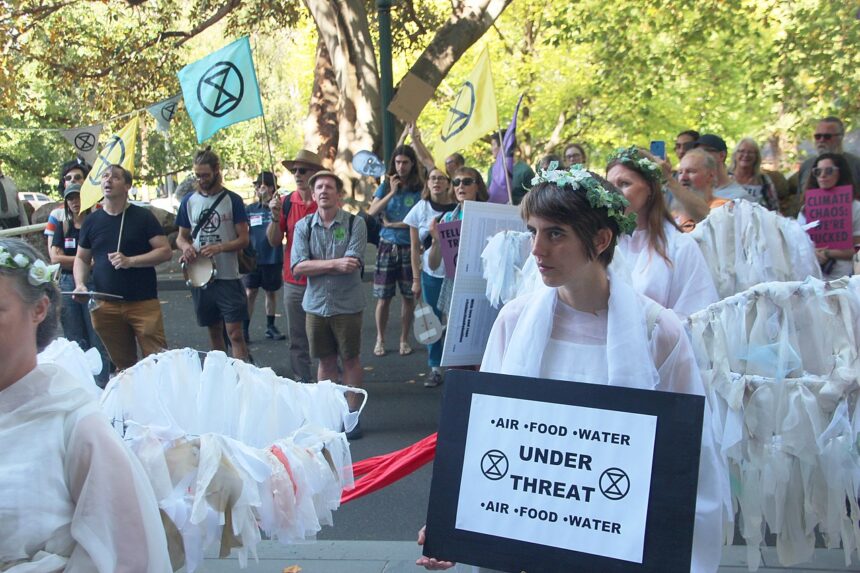What does it take to avert the end of the world?
For most of human history this has been a question for religion. And the answer has usually been that human beings must repent of their sins. They must surrender some comfort and luxury to appease angry gods. In primitive times worshippers might sacrifice a bull—or even a human being.
Today climate science provides an end-times prophecy that works in much the same way as the religious apocalypticism of old. Religion enchants the world, lending spiritual significance to every part of life. Climate change makes everything from charging your iPhone to skipping beef for dinner a potentially salvific act.
Cattle once again have to be sacrificed; they emit too much methane and CO2. And the dietary laws that climate science prescribes are as exacting as those of any religion. Every day is a fast day when you subsist on tofu and insect protein.
Purity and ritual cleanliness are religious concepts that find a remarkable parallel in the way of life that climate science promotes. By default, Apple’s phones are now set to “clean energy charging” mode, which takes longer to recharge the battery but contributes in however small a way to saving us from the weather.
Well-educated liberals laugh when a televangelist claims a hurricane is God’s punishment for America’s acceptance of homosexuality. Yet liberals also believe that weather is a moral force, punishing Americans for the sins of capitalism. When the remnants of Hurricane Ida flooded the New York subway, liberals assigned the deluge a cosmic meaning as a manifestation of climate change.
Bad weather is never simply bad weather anymore; every hurricane, flood or tornado is now imbued with deeper significance. Bad weather is humanity’s fault. We can only stop it if we live our lives a little more miserably.
Or much more miserably: If ordinary people are inconvenienced by climate ideology, true believers are prone to despair.
Climate “doomers” believe there is nothing to live for. They don’t want to have children, because who would want to bring children into a dying world? And since human beings are the cause of the climate crisis, inflicting more of them on the planet is morally wrong.
Last year on Earth Day one climate activist took his beliefs to their logical conclusion. Wynn Bruce burned himself alive outside the Supreme Court, a self-immolating martyr to climate ideology.
When the religious impulse is perverted, it turns from love of God to hatred for humanity. In 15th-century Florence the radical Dominican friar Girolamo Savonarola preached apocalypse and called for penitent citizens to burn their luxuries. Savonarola’s “bonfire of the vanities” consumed priceless manuscripts and works of art.
Recently climate activists in Europe have targeted museums and glued themselves to famous paintings. Are museums a leading source of carbon dioxide emissions? Of course not. But like Savonarola, climate vandals want to show that they hold human genius in contempt and beauty is vanity when the fate of everything is at stake.
Every year the UN’s Intergovernmental Panel on Climate Change (IPCC) warns that the end is nigh. This year’s report claims that global warming will pass a point of no return within the next decade.
That’s a smart prediction—not because it’s true but because it’s politically convenient. A 10-year deadline is close enough to stir up alarm but not so close as to be easily disproved when doomsday rolls around and nothing happens.
If Greta Thunberg follows the IPCC’s marketing strategy, she’ll save herself embarrassment. She recently had to delete a tweet from 2018 that said the world only had five years left.
The day of reckoning should always be just over the horizon, with no firm due date. “Within” 10 years does the job well. As in the Gospel, no man can tell the day or the hour when the world will pass away.
Anyone who knows the geological history of our planet is aware that over millions of years our planet has been much colder and much hotter than it is today. Our present era is one of steady warming, not because of human activity but because of the planet’s own long-range cycles.
If we cut all CO2 emissions tomorrow, the world would continue to warm. Floods and forest fires certainly would not cease.
The fact that the politics of climate science so closely mirrors religious apocalypticism ought to prompt some reflection.
End-times prophecy and the role of human guilt in the fate of the cosmos are not scientific concerns at all. From a purely scientific perspective, the world will keep spinning no matter how wicked or angelic humanity might be.
Climate ideology derives its power from its resemblance to religion. But it’s a poor substitute for a real faith, offering no hope of redemption by a benevolent God, but only punishment for our irredeemable sins; our lives will always have to get worse until the weather improves.
COPYRIGHT 2023 CREATORS.COM

Leave a Reply